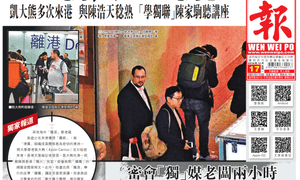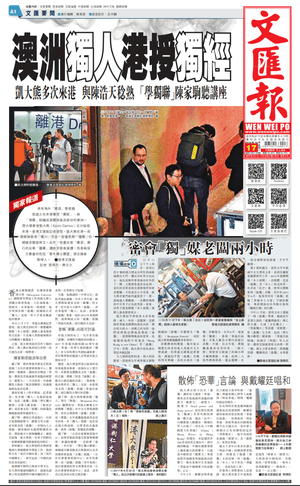By Kate Lyons

The front page of Wen Wei Po showing the activities of US-Australian academic Kevin Carrico during his visit to Hong Kong.
When Kevin Carrico landed back in Australia on Monday after spending a week in Hong Kong, his friend sent him a link to the front page of a Hong Kong tabloid.
It was covered with pictures of Carrico and details of his trip.
It seems reporters for the paper, Wen Wei Po, which has close ties to Beijing, had been following him all week, reporting details of who he met, where he went, even when he returned to his hotel to change his shirt.
There were photographs of the US-Australian academic, who works for Macquarie University in Sydney where he researches Chinese history and society, standing in the street.
Another shows him at the airport about to leave the country and a third shows him in conversation with a friend in a restaurant, that was clearly taken by someone sitting a few tables away.
Hong Kong’s Wen Wei Po featuring in-depth reporting of the movements of visiting Sydney academic Kevin Carrico.
“Wen Wei Po is very, very closely linked with the Liaison Office, which is Beijing’s office in Hong Kong,” Carrico said.
“I don’t know if this is an attempt to build up pressure to get me banned from Hong Kong, or to intimidate me from returning to Hong Kong.”
Carrico is a US citizen and Australian permanent resident and has just received a large research grant from the Australian government to undertake a project examining tensions between Beijing and Hong Kong.
He said he might have been targeted because he writes about Chinese power in Hong Kong, which inevitably sometimes leads to discussion of Hong Kong independence.
While Hong Kong is part of China, it is a special administrative region, with its own government, legal system and policies.
However, there are concerns that Beijing is making moves to bring the regions more firmly under its control.
The newspaper articles allege Carrico “has close ties with members of the Hong Kong independence organisation” and “secretly came to Hong Kong”, as well as listing all those Carrico met with during his week in the country.
The articles also included inane observations such as: “After that, Carrico returned to the hotel where he was staying and changed his shirt before attending a party;” and, “After the lecture, Carrico and a man returned to the hotel after eating at a nearby Korean restaurant.”
Carrico said independence was a topic that sometimes came up in his work, and he knew people who supported it, but there was nothing illegal or illegitimate about that.
When Kevin Carrico landed back in Australia on Monday after spending a week in Hong Kong, his friend sent him a link to the front page of a Hong Kong tabloid.
It was covered with pictures of Carrico and details of his trip.
It seems reporters for the paper, Wen Wei Po, which has close ties to Beijing, had been following him all week, reporting details of who he met, where he went, even when he returned to his hotel to change his shirt.
There were photographs of the US-Australian academic, who works for Macquarie University in Sydney where he researches Chinese history and society, standing in the street.
Another shows him at the airport about to leave the country and a third shows him in conversation with a friend in a restaurant, that was clearly taken by someone sitting a few tables away.

Hong Kong’s Wen Wei Po featuring in-depth reporting of the movements of visiting Sydney academic Kevin Carrico.
“Wen Wei Po is very, very closely linked with the Liaison Office, which is Beijing’s office in Hong Kong,” Carrico said.
“I don’t know if this is an attempt to build up pressure to get me banned from Hong Kong, or to intimidate me from returning to Hong Kong.”
Carrico is a US citizen and Australian permanent resident and has just received a large research grant from the Australian government to undertake a project examining tensions between Beijing and Hong Kong.
He said he might have been targeted because he writes about Chinese power in Hong Kong, which inevitably sometimes leads to discussion of Hong Kong independence.
While Hong Kong is part of China, it is a special administrative region, with its own government, legal system and policies.
However, there are concerns that Beijing is making moves to bring the regions more firmly under its control.
The newspaper articles allege Carrico “has close ties with members of the Hong Kong independence organisation” and “secretly came to Hong Kong”, as well as listing all those Carrico met with during his week in the country.
The articles also included inane observations such as: “After that, Carrico returned to the hotel where he was staying and changed his shirt before attending a party;” and, “After the lecture, Carrico and a man returned to the hotel after eating at a nearby Korean restaurant.”
Carrico said independence was a topic that sometimes came up in his work, and he knew people who supported it, but there was nothing illegal or illegitimate about that.
“It’s a violation of the freedom of speech promised to Hong Kong to pretend that discussion of independence is illegal,” Carrico said.
“I always say in the US cannabis was illegal but it wasn’t illegal to talk about cannabis, to talk about legalising cannabis, I think a similar sort of thing regarding HK independence.”
Carrico said the articles did at least make sense of the woman on the train who followed him throughout his first day in the country.
“I noticed a lady, maybe in her 30s, I felt like she was looking at me occasionally. I’m not a celebrity or anything close to that, but I thought, she’s wearing a University of Oxford sweatshirt, maybe she read my book or maybe she was thinking I look funny, I don’t know.”
The woman followed him off the train, into a shopping centre, even waiting for him outside the toilets.
“In a city of seven million people, even in a shopping mall, it’s unlikely you keep running into the same person,” he said.
After Carrico became concerned he twice tried to photograph the woman.
The first time, when she was riding behind him on an escalator she turned around and faced the other way, Carrico said.
The second time, she hid behind a tree.
“I always say in the US cannabis was illegal but it wasn’t illegal to talk about cannabis, to talk about legalising cannabis, I think a similar sort of thing regarding HK independence.”
Carrico said the articles did at least make sense of the woman on the train who followed him throughout his first day in the country.
“I noticed a lady, maybe in her 30s, I felt like she was looking at me occasionally. I’m not a celebrity or anything close to that, but I thought, she’s wearing a University of Oxford sweatshirt, maybe she read my book or maybe she was thinking I look funny, I don’t know.”
The woman followed him off the train, into a shopping centre, even waiting for him outside the toilets.
“In a city of seven million people, even in a shopping mall, it’s unlikely you keep running into the same person,” he said.
After Carrico became concerned he twice tried to photograph the woman.
The first time, when she was riding behind him on an escalator she turned around and faced the other way, Carrico said.
The second time, she hid behind a tree.
“Today’s Wen Wei Po article, where I take up the entire front page of a newspaper, begins to answer some of those questions. The people who were following me were probably from that newspaper. At the same time, that raises some pretty major questions. How did this newspaper know I was there? Do they have access to border control? How were they able to start following me the day after I arrived and how did they manage to keep a tail on me for what seems like an entire week?”
Carrico was light-hearted about some parts of the experience.
The Wen Wei Po article devotes several paragraphs to a talk he gave and Carrico joked that he wished he could have got similar media coverage for his speech before it was held.
“I could have got more people there. It wasn’t as well attended as I would have liked.”
But there were other points he found less funny.
“The article mentions my wife. They can write whatever they want about me, but I’d prefer they leave my family out of it.”
Carrico, who has been travelling to Hong Kong for 15 years said his experience would not deter him from continuing to do so, but he hoped it was not a sign of things to come.
“Hong Kong can’t follow China’s path of banning journalists and researchers if it wants to call itself Asia’s world city. I think the Hong Kong government might consider voicing their support for academic freedom, because clearly this is not a very welcoming message to send to academics.”
Carrico was light-hearted about some parts of the experience.
The Wen Wei Po article devotes several paragraphs to a talk he gave and Carrico joked that he wished he could have got similar media coverage for his speech before it was held.
“I could have got more people there. It wasn’t as well attended as I would have liked.”
But there were other points he found less funny.
“The article mentions my wife. They can write whatever they want about me, but I’d prefer they leave my family out of it.”
Carrico, who has been travelling to Hong Kong for 15 years said his experience would not deter him from continuing to do so, but he hoped it was not a sign of things to come.
“Hong Kong can’t follow China’s path of banning journalists and researchers if it wants to call itself Asia’s world city. I think the Hong Kong government might consider voicing their support for academic freedom, because clearly this is not a very welcoming message to send to academics.”
Aucun commentaire:
Enregistrer un commentaire